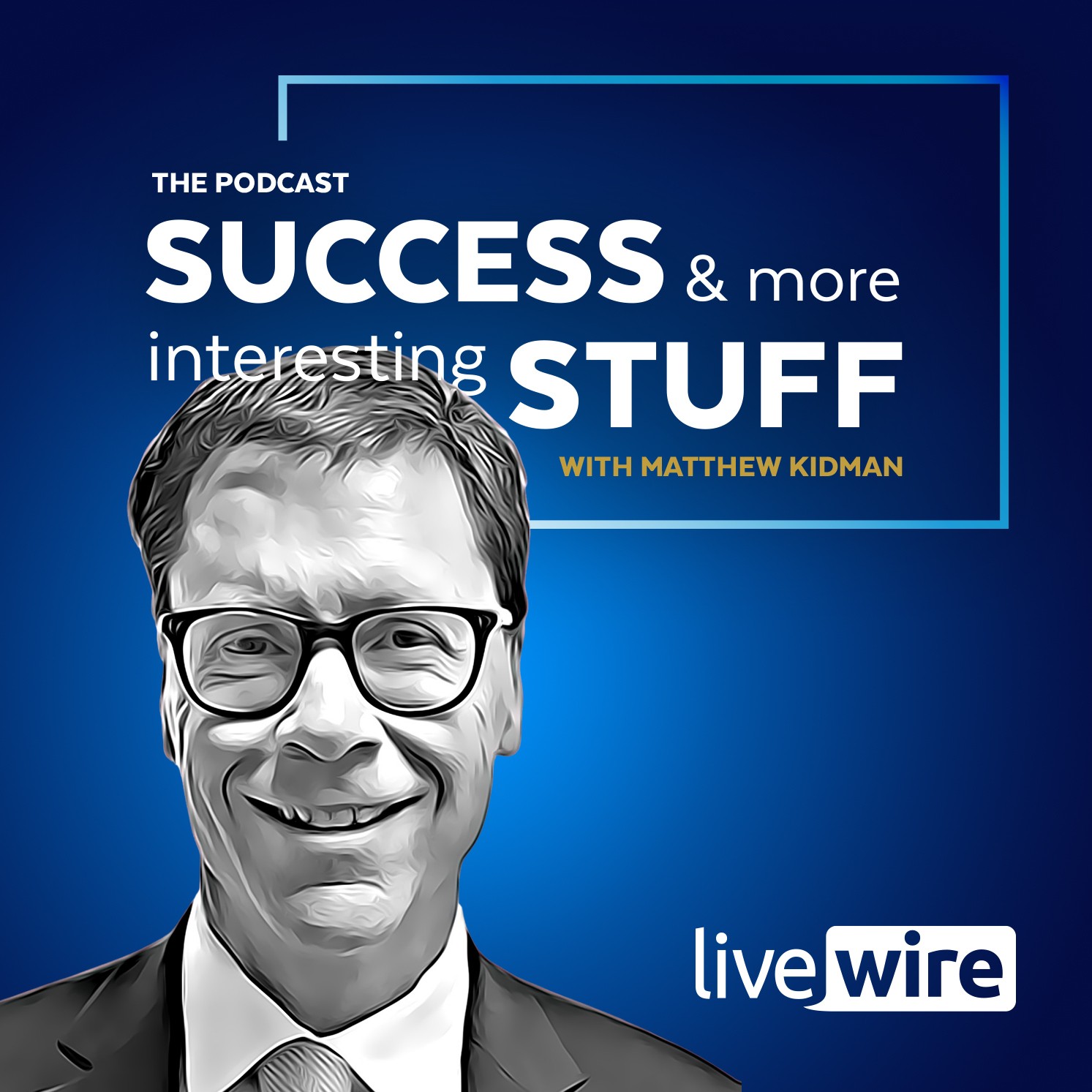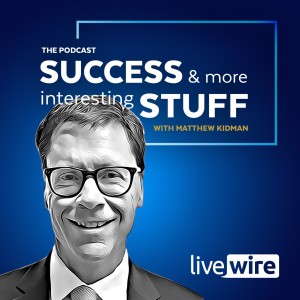
196.4K
Downloads
64
Episodes
Take a front-row seat to hear the stories behind some of Australia’s most successful and iconic sports people and business leaders. The show is hosted by Matthew Kidman, former business editor of the Sydney Morning Herald and author of three books. Kidman takes the time to uncover the rarely heard stories behind these successful individuals to give listeners a unique perspective of what makes them tick.
Take a front-row seat to hear the stories behind some of Australia’s most successful and iconic sports people and business leaders. The show is hosted by Matthew Kidman, former business editor of the Sydney Morning Herald and author of three books. Kidman takes the time to uncover the rarely heard stories behind these successful individuals to give listeners a unique perspective of what makes them tick.
Episodes

Tuesday Feb 03, 2026
This ain’t junk! Why GYG’s Steven Marks refuses to compromise on quality
Tuesday Feb 03, 2026
Tuesday Feb 03, 2026
Guzman y Gomez Founder & co-CEO Steven Marks joins Matthew Kidman to discuss his decision to leave Wall Street, the tough early years building GYG, why quality is non-negotiable, and what comes next as the business expands into the US.

Wednesday Dec 17, 2025
Gold, AI and the risks investors can’t ignore heading into 2026
Wednesday Dec 17, 2025
Wednesday Dec 17, 2025
To mark the 50th episode of Success and More Interesting Stuff, Matthew Kidman is joined by Chris Judd, Jun Bei Liu and Dr Shane Oliver for a panel discussion focused on four timely issues facing markets as we approach 2026.

Wednesday Nov 12, 2025
Mark Landau's best investment decision
Wednesday Nov 12, 2025
Wednesday Nov 12, 2025
Mark Landau’s best investment decision wasn’t a stock pick — it was meeting his future business partner, Rafi Lamm. Together they built L1 Capital from scratch into a $17 billion fund manager. In this episode, Landau reflects on the lessons from success, setbacks, and starting again as a listed company.

Tuesday Oct 07, 2025
Alexis George: Rebuilding AMP
Tuesday Oct 07, 2025
Tuesday Oct 07, 2025
From small-town Bega to the boardrooms of London and Hong Kong, Alexis George built a global career before taking on one of the toughest jobs in Australian business — rebuilding AMP. In this episode, she shares her story, the lessons she learned abroad, and how she’s reshaping AMP’s culture and strategy for the future.

Tuesday Sep 16, 2025
Viktor Shvets: The end of cycles and the cost of progress
Tuesday Sep 16, 2025
Tuesday Sep 16, 2025
Viktor Shvets on the end of cycles, the rise of the cloud of finance, and why politics may now be the greatest market risk.
At Livewire Live 2025, Viktor Shvets delivered one of the most anticipated keynotes of the event. Over four decades, he has built a reputation as one of the sharpest minds in global finance, unafraid to challenge consensus.
In this episode, Viktor explains why the old rules of cycles and mean reversion no longer apply, how financial markets have drifted into a “cloud of finance,” and why inequality and politics may prove the greatest risks ahead. It is a conversation that unsettles, but also clarifies what really drives markets today.

Tuesday Sep 02, 2025
Paul Moore: The only true arbitrage in markets is time
Tuesday Sep 02, 2025
Tuesday Sep 02, 2025
Four decades into his career, Paul Moore seems to be just getting started. Two years ago, he made the bold decision to vend his business, PM Capital, into Phil King’s Regal Partners. Many thought this was an exit plan for Moore. Instead, it proved to be the tonic he needed. PM Capital has since become a growth engine inside Regal, with close to $5 billion under management and performance that continues to deliver.
In this episode of Success and More Interesting Stuff, Paul shares what keeps him motivated, why he believes the only true arbitrage in markets is time, and how he is positioning portfolios in today’s unpredictable environment.

Tuesday Jul 29, 2025
Simon Conn’s guide to surviving the small cap 'torture chamber'
Tuesday Jul 29, 2025
Tuesday Jul 29, 2025
The professional investment game is relentless. No matter where you are in the world, you cannot escape the endless procession of markets. Sure, you can go on holiday and attempt the concept of relaxation, but each morning when you wake up, Wall Street has just closed. It’s impossible not to sneak a peek. Each month your numbers are measured against the market and your peers. There is no hiding.
After 27 years and more than 50 reporting seasons, one of the mainstays of the Australian share market, IML’s Simon Conn, is stepping aside for a well-earned break. It might be permanent. It might be a refresh. Only time will tell.
Conn joined IML back in 1998 - teaming up with market legend and past guest Anton Tagliaferro. Before long, Conn found himself overseeing the tough end of town - small caps.
In those 27 years he has seen the rise of the internet, the smartphone, the GFC, COVID, and now the AI revolution. Through all of that, investors like Conn have been told it’s a new world. Concepts like ARR, PCV and the Rule of 40 have taken hold, while old measures like PE ratios have been pushed aside for revenue multiples.
Meanwhile, the Small Ords index has underperformed for decades. It all sounds like a torture chamber, but somehow Conn has come through it, delivering 12 percent returns for more than two and a half decades.
In this episode of Success and More Interesting Stuff, Conn shares the lessons he learned over his career and how he adapted his approach as markets evolved and over the past three decades.

Tuesday Jul 01, 2025
Nick Griffin on finding stocks that can double earnings in 5 years
Tuesday Jul 01, 2025
Tuesday Jul 01, 2025
Nick Griffin’s path to fund management may have seemed preordained, his father worked in the industry, but his journey has been anything but ordinary.
After completing a commerce degree, Griffin missed out on a graduate role with one of the big four accounting firms. That setback led him to the Commonwealth Bank’s investment team, where he cut his teeth before embarking on a backpacking trip that ultimately set the trajectory for his career.
Landing in London, Griffin took on a role as an oil and gas analyst and soon found himself in Edinburgh, the traditional home of UK fund management. It was there he immersed himself in the world of long-term capital, working closely with some of the oldest and most respected investment houses in Europe.
Eventually, Griffin returned to Australia and joined K2 Asset Management, where he ran the firm’s global fund. Then, in 2017, he co-founded Munro Partners with a clear mission, back companies set to double their earnings in five years or less by riding powerful structural tailwinds.
In this episode of Success and More Interesting Stuff, Griffin shares how he built Munro from $20 million to more than $5 billion in FUM, the key signals he looks for in structural winners, and what comes next for AI, healthcare, and defence investing.

Tuesday Jun 03, 2025
Tuesday Jun 03, 2025
Jake Klein left a high-flying banking career to chase a hunch about gold, and it paid off in spades. From pioneering mining ventures in China to building Evolution Mining into a $16 billion powerhouse, Klein has made a habit of spotting value where others see risk. In this episode of Success and More Interesting Stuff, he shares how growing up in South Africa shaped his thinking, why Western democracies are unprepared for what’s coming, and what the gold price is really telling us.

Friday May 09, 2025
How Fidelity’s Paul Taylor stays ahead of the market
Friday May 09, 2025
Friday May 09, 2025
We're often told that beating the market over the long term is impossible. A lucky year or two? Maybe. But doing it for more than two decades? That’s supposed to be out of reach.
Paul Taylor has defied that logic. Managing a concentrated portfolio of 30 to 50 local stocks through everything from the GFC to the COVID crash. It sounds exhausting - but he shows no signs of slowing down.
In today’s turbulent market, Taylor’s perspective is more relevant than ever. In this episode of Success and More Interesting Stuff, he shares the key ingredients for long-term success, explains why failure is inevitable in stock picking, and offers his view on why the current obsession with tariffs and trade tensions will ultimately be seen as little more than short-term noise. It’s a rare opportunity to hear from one of Australia’s most consistent and enduring investors.
